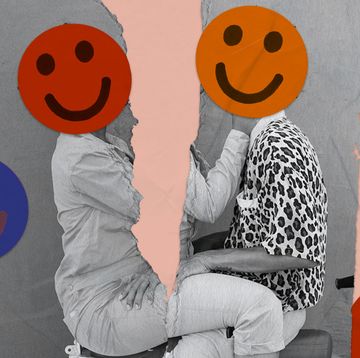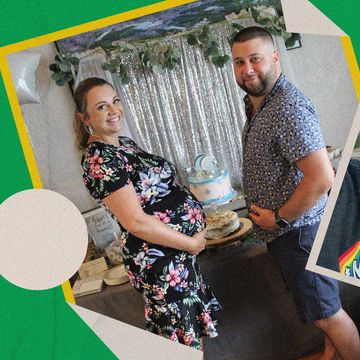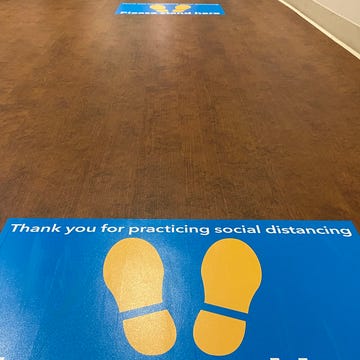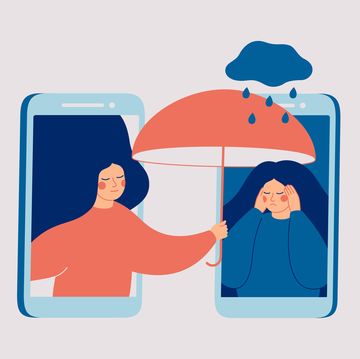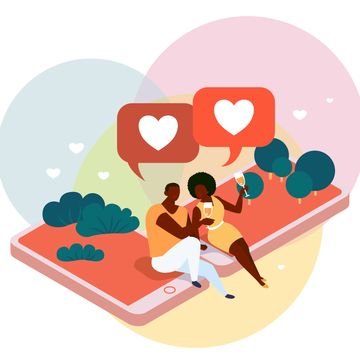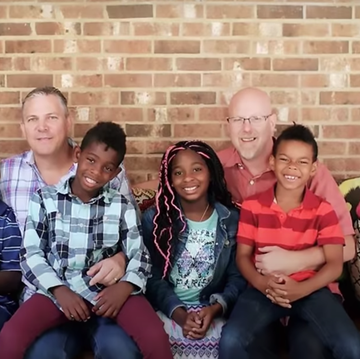There’s only one thing scarier than putting yourself out there when dating: wondering what went wrong. When you work up the courage to reach out, only to get one-word responses or — even worse — radio silence, it definitely hurts. The person starts posting pictures to social media, but you haven’t heard back from them in weeks. You’re actively being ignored, or what’s widely known today as being ghosted.
Tennesha Wood, a relationship expert and the founder of The Broom List, sees ghosting happening frequently. “Things seem to be going good, somebody goes out on a date, things end well, next thing you know, they don’t hear from the person they went out with, and they’re completely mystified as to why,” she says. A person who’s been ghosted may find themselves going through every possible scenario in their head as to why it happened, from what they said (or should have said or didn’t say) to how they acted or dressed.
Wood says ghosting often comes, perhaps shockingly, from a position of protection. “It tends to happen because people are scared,” says Wood. They don’t want to experience the equally awful feeling of letting someone else down, so they disappear. “I think that the more mature that people become,” she says, “the more they realize that’s not the way to handle these scenarios.”
Some may believe that there’s no real benefit to rejecting someone directly, but it’s actually quite the opposite. “When you actually communicate why something isn’t for you, you’re helping yourself, and you’re actually helping the other person,” Wood says. Being confident enough to express what you do and don’t want in a relationship is not only an act of empowerment, but it also allows you to get to know yourself better. Wood says it also benefits the other person “because a lot of the time, you don’t know how you’re coming off to another person.”
Whether you’re the ghoul or the one who is being left behind, here’s how to handle being ghosted, with some tips on avoiding being a ghoster yourself.
What to do when you’ve been ghosted
Don’t draw conclusions or make assumptions — yet
If you receive no response from the person you’re seeing, it can be tough to know how many days you should wait before reaching out. Wood says it’s a good idea to consider how often you typically talk to this person (or, if it’s a newer connection, how often you like to talk to someone you’re getting to know). It all depends on what feels right and makes sense to you.
If several days have gone by, and you haven’t heard from this person, don’t jump to the worst possible conclusion. Wood recommends reaching out and letting them know you enjoyed your time together and would like to see them again. “That opens the door for the other person to acknowledge and agree,” she says.
Make a decision
If the person doesn’t respond to your second message, you get to take ownership over what happens next. Wood says you can confront it head-on with a follow-up, for example: “Hey, I haven’t heard from you. Just wanted to make sure that we’re not missing each other, but if you’re not interested, that’s okay too. Just let me know.” She even offers up a more humorous script: “Hey, is this happening? Am I being ghosted?”
The other option is to let it go — which is easier said than done. “The hard part,” Wood says, “is not questioning yourself, because you can go into a rabbit hole of what happened.” She says that self-talk is helpful in dealing with the invisible wound. “Just saying, ‘Look, if I’m actually looking for a good relationship, I want to be in a relationship with somebody that’s going to communicate with me, whether it’s good, whether it’s bad.’” She continues, “‘I require communication in a healthy partnership. If this is a person that’s not willing to give that to me, and I’ve opened the floor to that, that’s probably not a person that’s for me.’”
Learn for next time
When someone disappears, it’s a great time for reinvention and taking time to understand your desires more deeply. The first thing you should do after dealing with a ghoster is figure out your preferred style of communication. Wood recommends answering these two questions: How do you like to communicate, and how often? “It’s almost like a love language, but a communication language,” Wood says.
If you are the type of person who likes, requires, or is comfortable talking to a person pretty frequently, express that. If you prefer or don’t mind talking every couple of days, say that too. The follow up to that, Wood says, is asking, “Are you the type of person who needs to text and communicate frequently and talk frequently? Or are you like, ‘Hey, we have a date on Friday. See you on Friday.’” Establish those preferences proactively rather than retroactively because understanding what type of communication you need — and what type of communication the other person can give — is crucial to dating. “Those conversations need to be had way early. I would even say that’s a first-date conversation,” Wood says.
Know what you want and accept what you deserve
If someone hasn’t technically ghosted you, but things have changed (we’re talking paragraphs of text messages that suddenly turned into one-word sentences), that’s something worth discussing as well. There’s nothing wrong with saying, “Hey, our communication used to be a lot heartier. We used to have more robust communication — are we still on the same page?”
“At the end of the day, don’t accept something that’s not for you,” Wood says. “Don’t settle for something that you don’t want just to have this person around, if they’re not giving you the type of attention and communication that you desire. After you’ve stated what you need, if somebody can’t deliver that, don’t accept crumbs. Just move on.” Someone out there will give it to you.
How to stop ghosting — and respectfully decline
Reframe rejection
Choosing not to ghost someone is an act of self-improvement, self-love, and self-empowerment.
“It takes confidence not to ghost,” Wood says. “You have to be confident enough to say to yourself, ‘My feedback that I’m going to give this person is valid, and it’s coming from a good place. So therefore, it’s the right feedback for me to give.’”
Wood continues, “I think there’s a lot to be said for people who face things head-on. Whether that’s your job or your relationship or how you go about your daily life, it builds you as a person to truly sit down and think about what you need … and communicate that in a way that helps you to get it, but also helps other people to understand you. We need to get into the daily practice of understanding ourselves, creating structure and communicating when things need to be better. That’s just a good habit to have for everything in your life.”
Truly think it through
It’s easier to be forthcoming about not wanting to move forward with someone when your reasons are mature, specific, and thoughtful. Take time to truly evaluate why this relationship wouldn’t work out in the long run. “If your reasons are not meaningful, you’re actually really not ready to date seriously,” Wood says. “If they’re coming from a good place, it’s easier to communicate than just if you have a silly quirk that you are being weird about.”
Consider what you actually want out of a relationship, if your values align, and if you want the same things for the future. This way, you’re able to walk away knowing that person didn’t meet the things you were looking for, but it’s not personal. “Maybe you say you enjoyed hanging out, but your future plans don’t align. That’s absolutely valid,” Wood says.
Give specific feedback
“It’s me, not you” just doesn’t cut it these days. “I think the best thing that you could do, or the best gift that you can offer somebody, is to give specific feedback,” Wood says.
It’s not about putting somebody else down for what they didn’t bring to the table or what they couldn’t offer you, but really it’s about helping them understand you more and what you need. Sometimes, that inherently means pointing out something that they may be doing unintentionally.
“Be helpful, not hurtful,” Wood says. The goal is to be honest and transparent but not rude or overly honest. The best way you can do this is by saying, “Hey, here’s what I’ve been experiencing” or “Here’s what I’m looking for in a relationship.” Then be open to a conversation about it.
Remind yourself that you did the right thing
Choosing to be direct with someone can be hard. The emotionality of these scenarios doesn’t always apply just to the person being ghosted; it can hurt to ghost someone too. Especially if you were fond of the person in some way.
“I think at the end of the day,” Wood says, “you just have to tell yourself [that] I am doing this because I want to meet the right person or be in the right situation for me.” Wood says that although it’s hard, it’s admirable to not want to waste somebody else’s time, and ultimately your own. “It hurts. But ultimately, I’m helping that person to go on and either improve or meet their person. You’re really saving everybody time, and you’re giving somebody the opportunity to move on and get what’s right for them in the same way that you are.”
Mia Brabham is a staff writer at Shondaland. Follow her on Twitter @hotmessmia.
Get Shondaland directly in your inbox: SUBSCRIBE TODAY




